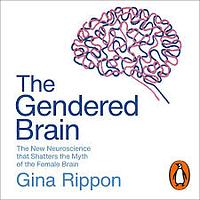Take a photo of a barcode or cover
227 reviews for:
The Gendered Brain: The New Neuroscience That Shatters the Myth of the Female Brain
Gina Rippon
227 reviews for:
The Gendered Brain: The New Neuroscience That Shatters the Myth of the Female Brain
Gina Rippon
funny
informative
inspiring
reflective
slow-paced
I'm not quite sure it lives up to its subtitle, but it does demonstrate the significant effects of culture from a very early age, and that neuroscience may not have the answers to gender difference.
challenging
informative
inspiring
medium-paced
informative
inspiring
medium-paced
An extremely important book, not to say fundamental, to take stock of the situation on the subject of studies on neurophysiology of the brain, in particular with regard to sexual dimorphism. The conclusion? As I already suspected, having often been classified a woman with a male brain, is that the real difference is the environment in which the individual grows up and the stimuli he/she is subjected to. Even today too little is done to stimulate girls to express their potential, and still (unfortunately) rare are the cases in which parents and educators - especially mothers, I regret to say - don't apply stereotypes to the frame of reference in which their daughters have to move. In the meantime, nonsense continues to have resonance boxes in the form of magazine headlines and today, with social media, posts that carry on a social stigma towards women.
Good: Provides data, asks questions, doesn't comment on things author has no experience of, e.g. being trans, critically questions the data. Nuanced understanding and conclusions.
Bad: Like Simon Baron-Cohen, and most non-autistic researchers of autism, doesn't actually bother asking why we do something before theorising on us. Uses outdated and stigmatising language like 'transsexual' and autism as 'disorder' or 'mental illness'.
Bad: Like Simon Baron-Cohen, and most non-autistic researchers of autism, doesn't actually bother asking why we do something before theorising on us. Uses outdated and stigmatising language like 'transsexual' and autism as 'disorder' or 'mental illness'.
informative
medium-paced
Empowering, based in science and brave, this book reflects my experiences of how sex and gender influences people and calls into question something we should have always been apprehensive of. In a history of WEIRD scientists and psychologists, this is another area of our understanding of the world which is clearly biased and calls to be rectified. I have not followed up on every reference but those which I have are reflected accurately in Rippon’s writing. An enjoyable, funny and engaging read.
There were a lot of interesting facts in this book, and a lot of information that I think is very important. That said, I had a hard time staying engaged. The main thesis throughout is that science has not yet identified any consistent, "hardwired" difference between male and female brains, and seems unlikely to do so anytime soon. The author painstakingly goes through where such ideas have cropped up in the past and takes to task the flawed research and science journalism that have enabled the continuation of various common misperceptions. This is done with a lot of discussion of studies, statistical analysis, and more studies. She maintains a wry sense of humor throughout, but it's hard for me to see much of this as anything but dry, especially since this was already pretty much the sense I had of the general state of things. I'm not nearly scientifically literate enough to be able to argue the points as thoroughly as she does, but I also don't need to be convinced, so without any mind-blowing challenges to my preconceived notions to keep my attention, it felt very much like sitting through a very detailed explanation of why the people I was pretty sure were wrong, were in fact wrong.
She does a very good job of emphasizing throughout how complex the interactions between environmental and biological factors are, and how inadequate the binary framing of "nature vs. nurture" is, but she also doesn't even approach the idea of sex or gender as a spectrum rather than a binary until the final chapter, which felt like a missed opportunity. Not only do I think that angle could have greatly informed and deepened the analysis in prior chapters, but to be honest, that was the aspect I found most interesting, and I was disappointed it didn't elicit a more thorough discussion.
Overall, for me, this book was a bit of a slog, but if you or someone you know still needs convinced that women and men are indeed of the same species, and mentally more alike than different, this would be a very good place to start.
She does a very good job of emphasizing throughout how complex the interactions between environmental and biological factors are, and how inadequate the binary framing of "nature vs. nurture" is, but she also doesn't even approach the idea of sex or gender as a spectrum rather than a binary until the final chapter, which felt like a missed opportunity. Not only do I think that angle could have greatly informed and deepened the analysis in prior chapters, but to be honest, that was the aspect I found most interesting, and I was disappointed it didn't elicit a more thorough discussion.
Overall, for me, this book was a bit of a slog, but if you or someone you know still needs convinced that women and men are indeed of the same species, and mentally more alike than different, this would be a very good place to start.





